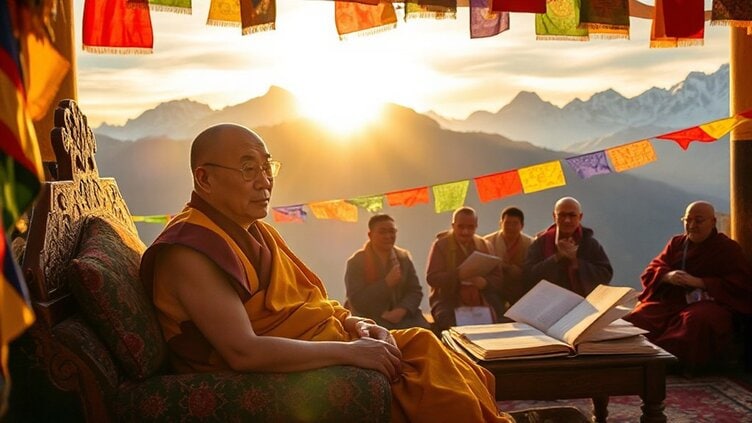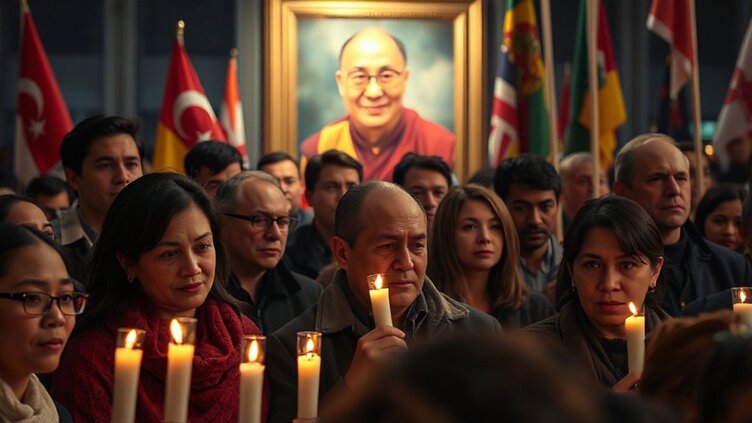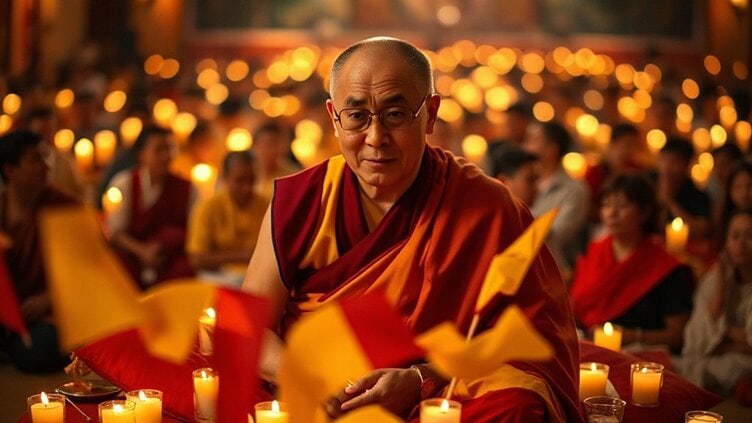The Dalai Lama’s future and the trajectory of Tibetan Buddhism are influenced by pivotal succession plans and cultural identity. The Dalai Lama’s teachings highlight compassion and interconnectedness, which resonate globally. The debates surrounding the next Dalai Lama’s gender and nationality challenge traditional norms and possess significant geopolitical implications. The rising tensions between India and China regarding this matter impact Tibetan leadership and autonomy. The succeeding figure may redefine the landscape of Tibetan Buddhism. The intricate dynamics at play can lead to potential consequences for the Tibetan community and its global representation.
Key Takeaways
The Dalai Lama’s succession plan aims to preserve Tibetan identity and teachings amid changing geopolitical circumstances. The potential successor could be of any gender or nationality, which challenges traditional Tibetan leadership norms. The succession process could influence regional stability, particularly in the context of India-China relations. The Dalai Lama emphasizes the promotion of human values, shaping the future direction of Tibetan Buddhism. Global reactions highlight a collective desire for harmony, underscoring the Dalai Lama’s ongoing significance in promoting peace.
The Dalai Lama’s Birthday Message

The Dalai Lama’s birthday message emphasizes his enduring identity as a simple Buddhist monk.
The Dalai Lama commits to promoting human values and religious harmony.
The Dalai Lama highlights the relevance of ancient wisdom from Indian philosophy in understanding the complexities of the mind and emotions.
This focus on mental well-being and compassion positions Tibetan culture as a meaningful contributor to global peace.
The Dalai Lama defines his role through simple monkhood, inviting others to embrace humility and interconnectedness.
The Dalai Lama’s message serves as a reminder of the potential for ancient teachings to guide contemporary discourse on ethics, tolerance, and universal compassion.
Insights on Succession Plans

The topic of the Dalai Lama’s succession plan underscores significant implications for Tibetan Buddhism.
The succession plan attributes a commitment to human values and compassion, which aims to ensure the continuation of teachings.
The reincarnation debate presents an open perspective on diverse identities, challenging traditional political dynamics in the region.
The legacy security derived from this plan preserves Tibetan identity, ensuring teachings persist amidst changing circumstances.
The planned shift in spiritual leadership maintains global relevance, indicating a potential successor could be of any gender and nationality, thus redefining norms within Tibetan Buddhism.
Global Reactions and Response

The global community’s response to the Dalai Lama’s recent announcements highlights a collective yearning for global harmony.
India’s Prime Minister Narendra Modi attributes praise to the Dalai Lama for his enduring message of compassion and patience.
The Dalai Lama’s commitment to cultural exchange fosters dialogue among diverse faiths, enhancing mutual understanding.
The Dalai Lama emphasizes the potential of Tibetan culture to contribute to global peace, sparking renewed interest in Buddhist principles.
Leaders and citizens alike express admiration for the Dalai Lama, reinforcing support for his vision.
The discourse surrounding the Dalai Lama’s succession signifies the importance of continuity in promoting human values and spiritual guidance across borders.
The Significance of Tibetan Culture
The topic of Tibetan culture embodies a rich tapestry of traditions, philosophies, and practices.
Tibetan culture serves as a lighthouse of spiritual and ethical guidance for individuals and communities.
Tibetan culture illuminates the path of spiritual wisdom and ethical living for all.
The cultural significance of Tibetan culture extends beyond its geographical borders, promoting values such as compassion and mindfulness among diverse populations.
The emphasis on inner peace within Tibetan culture fosters communal harmony and unity among various communities.
Tibetan culture provides a foundational framework for addressing contemporary global challenges by advocating for empathy and understanding.
The teachings of Tibetan Buddhism offer crucial insights as the world grapples with conflict, reinforcing the notion that cultural preservation is pivotal for a harmonious future.
Political Implications of Succession
The topic of the Dalai Lama’s succession, a significant event in Tibetan Buddhism, influences the geopolitical landscape of the region.
The succession, characterized by profound political implications, could exacerbate existing tensions between India and China, both of which have vested interests in the outcome.
The potential for a successor, whether of any gender or nationality, introduces uncertainty, which challenges traditional norms surrounding Tibetan leadership.
The next Dalai Lama, if embodying a more assertive approach to Tibetan autonomy, may shift power dynamics in the region.
The succession remains a pivotal element in the broader context of regional stability, affecting not only Tibet but also the interactions between neighboring nations.
Future of Tibetan Buddhism
The topic of Tibetan Buddhism, a rich spiritual tradition, faces significant challenges in the context of geopolitical tensions.
The aging Dalai Lama, as a central figure, creates uncertainty regarding the future leadership of Tibetan Buddhism. The potential for a spiritual vacuum emerges with the Dalai Lama’s eventual succession, which could redefine Tibetan identity and influence its role in global spirituality.
The external pressures from China, as a formidable force, complicate the preservation of Tibetan culture and autonomy, presenting further obstacles for Tibetan Buddhism.
The resilience of Tibetan Buddhism will depend on its ability to adapt to these challenges while maintaining core values of compassion and peace.




